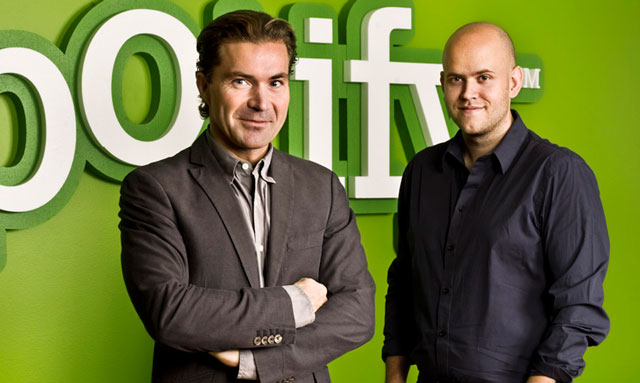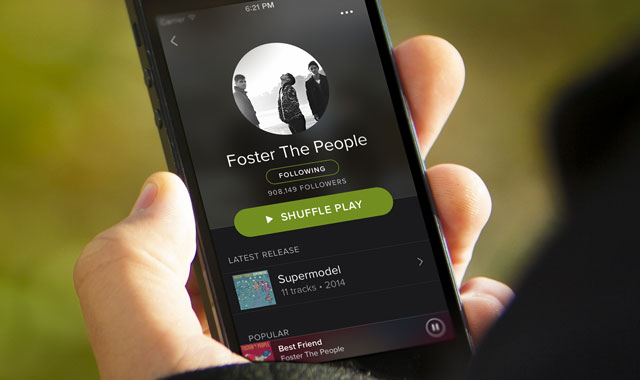
It appears that one of world’s most popular music subscription services, Spotify, is getting ready to launch in South Africa, and possibly other markets in Africa, in the coming months.
The Swedish company has appointed Oscar Sehlberg Westergård to head up the region and sources say the firm, which already offers its services in 56 countries, is readying its South African offering.
Westergård signalled his interest in providing details about Spotify’s plans for South Africa and other markets in Africa this week, but then backtracked. The company instead sent a bland statement from its PR office: “As you know, Spotify is not currently available in South Africa. Spotify’s ultimate aim is to be available everywhere, but we have no news on a launch in South Africa at the moment.”
Spotify’s launch in South Africa will up the ante in what is already a fairly hotly contested music streaming space — Nokia MixRadio, Simfy Africa, Deezer, Rdio and Rara all offer services already. However, big international players such as Google, with Play Music, and Microsoft, with Xbox Music, are yet to launch. (The latter said as far back as 2012, ahead of the launch of Windows 8, that it intended providing Xbox Music in South Africa, but it has failed to do so.)
Spotify was founded by Daniel Ek (its CEO), 31, and Martin Lorentzon (chairman), 44, in 2006. Napster founder Sean Parker joined Spotify’s board in 2010. Parker was recruited to “win the music labels over”.
Spotify recently announced that it has 10m paying subscribers and more than 40m active users across its 56 markets. Its largest competitor is Pandora, which recently announced that its active user base is about 76m users. But the company is growing more slowly and is only available in the US, Australia and New Zealand. According to a recent investor relations report, Pandora has actually lost 200 000 listeners since December 2013. Having said that, its listener metrics, released in April, show that its users are using it more intensively than before.
Spotify, on the other hand, has enjoyed impressive user growth since its commercial launch in October 2008. Two years later, in September 2010, Spotify reached 10m global users, of which 2,5m were paying for the service. Spotify had doubled its user base by the end of 2012, with 20m users around the world and 5m paying subscribers.
It employs more than 1 200 people around the world and hosts a music library of more than 20m songs. Incidentally, Spotify said recently that about 80% of the music in its library has been streamed at least once, meaning there are 4m songs that have never been played.

The company adds 20 000 songs a day to its catalogue.
In 2013, Spotify streamed about 4,5m hours of music to its customers. Spotify users have also created a billion playlists, which can be shared with other users on the platform.
There has been some controversy with streaming music services and the royalties it pays to artists. Spotify has said that about 70% of its revenue is paid back in the form of royalties, and that this equated to about US$1bn since 2009. The royalties are split among rights holders in accordance with the popularity of their music on Spotify. It is then up to the label or publisher to divide the royalties to each artist depending on their individual deals. The average royalty payout “per stream” is between $0,006 and $0,0084, according to Spotify’s Artists blog. This website also shows that Spotify pays out between $6 000 and $8 400 per million listens. It claims that this compares favourably to other online streaming sites.
The competition
When Spotify enters South Africa, it will have a number of competing services to deal with. Currently, the most popular services include Simfy Africa and Nokia MixRadio.
— Deezer launched in South Africa in 2013 and has one free, ad-based plan and two paid-for services. A Premium account, which offers Web-only access, costs R29,99/month, while a Premium+ service allows for both Web and mobile access at R59,99/month. (At the time of writing, Deezer was running a 50% discount for all Premium+ accounts.) Deezer has a music library of 30m tracks. It has 5m paying subscribers.
— Nokia MixRadio is a revamp of the company’s Ovi Music store. MixRadio allows for free streaming of playlists and there are no ads in between songs. Upgrading the service to Nokia Mixradio+ for R25/month allows users to view lyrics, skips songs and download playlists. There are 30m songs in the MixRadio catalogue.
— Simfy Africa was one of the first paid-for music streaming services that was made available to South African music fans. At R60/month for a Premium Plus plan, Simfy gives users access to 23m songs and it has a large selection of local music in its catalogue. There’s also a R25/month Web-only version that excludes mobile and offline use.
— Rara was launched in South Africa in the latter part of 2012. The UK-based service offers a Web-only subscription at R33,99/month (R6,99/month for the first three months) while its Premium option, which allows access across a number of platforms and devices, is R68,99/month (R13,99/month for the first three months).
— Rdio is the latest streaming music service to launch in South Africa, having gone live in December 2013. Its jukebox consists of more than 20m tracks and costs R25/month for unlimited streaming on PCs and R60/month when mobile is included. Offline listening is also provided.
While it’s not known yet how much Spotify will charge for its South African service, the company has a free, ad-supported, version available in other markets. Users can opt for a Premium subscription at £9,99/$9,99, which is ad-free and allows users to listen to songs in an offline mode.
Considering its popularity around the world, Spotify is destined to make waves in the South African market. It’s the only company that allows third-party plug-ins into its music library. A good example of this is Algoriddim, which allows deejays to stream Spotify music directly into the software.
Spotify is available on most popular platforms, including Windows, Windows Phone, Linux, BlackBerry, Android, iOS, Chrome OS and OS X. — © 2014 NewsCentral Media




